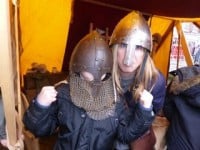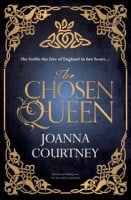Why write historical fiction?
Why write historical fiction?
All my life I've been fascinated by the past. I remember as a child visiting Holyrood Palace in Edinburgh and standing over the (presumably re-touched) bloodstain where David Rizzio was murdered by Lord Darnley and being forcibly struck by the reality of standing on the same spot - the very same boards – where the killing had taken place. That sense of layers of human experience has remained with me always and these days I’m lucky enough to live in a little Derbyshire house that was built in 1745. At the heart of it is a big stone fireplace and every time we light it (which has been pretty often in this cold winter) I think of the many others that must have sat around it before me. History, to me, is something that is still very much alive, so it seemed natural to delve into the past for my fiction.
I don’t suppose ‘50-shades’ could teach your average Viking much...
But why so far into the past? I’m not entirely sure but I think it’s something to do with the lure of the unknown. Perhaps it’s simple perversity – history says ‘we’ve not got a lot on that period’ so I instantly want to know more. Or maybe it’s something abut the almost mythical lure such fact-gaps create. In my English literature degree I specialised in Medieval and Arthurian literature and the latter in particular fascinated me as a borderland between history and story . Was there a real Arthur? Did he bear any resemblance to the hero that layer upon layer of storytelling has gradually created? And does it matter?
 ‘Does it matter’ is a very pertinent question for me as a historical novelist – how ‘real’ are my novels? The answer, clearly, is that the characters themselves, although they are based on people who truly existed, are not real at all; their personalities and emotions are entirely my own extrapolations. I have always, however, strived to write not what necessarily was but definitely what could have been. My novels operate within known dates and facts wherever we have them, but the rest is my own take on events. It’s the best any historical novelist can do, but hopefully the result is a vibrant route into another world. If readers pick up a few facts along the way, that’s good, but I am definitely out to create more story than history.
‘Does it matter’ is a very pertinent question for me as a historical novelist – how ‘real’ are my novels? The answer, clearly, is that the characters themselves, although they are based on people who truly existed, are not real at all; their personalities and emotions are entirely my own extrapolations. I have always, however, strived to write not what necessarily was but definitely what could have been. My novels operate within known dates and facts wherever we have them, but the rest is my own take on events. It’s the best any historical novelist can do, but hopefully the result is a vibrant route into another world. If readers pick up a few facts along the way, that’s good, but I am definitely out to create more story than history.
This is mainly, I guess, because what primarily fascinates me about history, and about the Saxon era in particular, is not so much the differences between life then and now, as the similarities. Next year - 2016 - will be the 950th anniversary of the Battle of Hastings. In some ways that’s a long time and clearly culturally and, in particular, technologically, we have moved on hugely since 1066. In terms of the evolution of humanity, though, it’s nothing.
Despite slightly differing living conditions from our own, Saxons, Vikings and Normans would, I am sure, have felt much the same as we do. They’d have loved their children, fought with their siblings, made and lost friends. They’d have laughed and cried. They’d have hurt and grieved, and they’d have fallen in love. They might have accepted different rules about who they could marry, especially higher up the social tree, but the heady rush of love is certainly not a new invention and there are still plenty of unusual matches and babies documented to attest to that. Without getting too graphic, two people naked in bed together are not going to be much different be they under Saxon furs or a 21st-century duvet. And I don’t suppose ‘50-shades’ could teach your average Viking much either!
The pre-conquest Europeans were people, as we are people, and they didn’t live from headline to headline. Battles, even in those times, were few and far between and in the intervening days people would get on with the business of life – getting up, getting dressed, envying other people’s dresses, working, socialising, eating, drinking, drinking too much, getting up with a hangover…
There are many gaps in our knowledge of the Saxon period, but for a writer those gaps are like goldmines. I love the process of sifting through facts and gradually creating a historical picture into which I can insert my own interpretation of not just how things might have happened but why and, perhaps most importantly of all, what impact that had on the people they happened to.
It’s probably insanity to choose to write historical fiction. The weight of research is heavy and however much of it you do, there will always be someone waiting to catch you out. You make up your characters, yes, but it’s less an act of invention than interpretation. You cannot so much choose what they do as how and why they do it, but I find those tight lines exciting.  I guess it’s a bit like a poet choosing to write a sonnet, or a sestina – a form with rigid paradigms. To some extent it is a constriction but it is also a freedom to bring your own mind to a predefined frame.
I guess it’s a bit like a poet choosing to write a sonnet, or a sestina – a form with rigid paradigms. To some extent it is a constriction but it is also a freedom to bring your own mind to a predefined frame.
For me, though, it is nothing so cerebral or worthy – it’s something much simpler. I love history and I cannot resist seeking to give it shape and make it live. That may be arrogant, but you could say that writing fiction of any sort is arrogant. All novels aim to lead a reader into a world and if my world happens to be nearly 1000 years ago, so what? The people that live in it are still, as I said above, people and I really hope that when the first novel of my trilogy, The Chosen Queen, comes out in May my readers enjoy getting to know them as just that.
THANKS FOR READING
Want to stay in touch?
Do say hello on Twitter
or join my mailing list for regular news and offers
Hope to see you soon - Joanna
